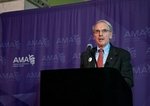Government
Revised language in proposed HHS rule still bolsters abortion conscience laws
■ Some doctors fear access-to-care limitations, while others praised the protections.
By Amy Lynn Sorrel — Posted Sept. 22, 2008
- WITH THIS STORY:
- » 3 laws over the decades
- » Related content
The Bush administration stirred the medical community in August by proposing a regulation reinforcing protections for physicians who object to providing abortion-related services based on moral or religious beliefs.
While some doctors welcomed the measure in the face of what they say are increasing pressures to compromise their medical ethical standards, other physicians worried that its broad language could inhibit access to care if allowed to take effect.
The Dept. of Health and Human Services said its proposal, released Aug. 21, was intended to harmonize and clarify more than three decades of existing federal conscience laws. Those statutes allow the government to withhold or revoke federal funding from federal, state or local entities that discriminate against doctors, nurses and others who opt not to offer or cover abortion services.
The latest rule, which could become final following a 30-day comment period, would establish a mechanism for enforcing the existing conscience protections by requiring recipients of certain federal funds to certify in writing their compliance with the federal laws. It also would authorize the HHS Office for Civil Rights to review complaints of any alleged discriminatory actions.
"This proposed regulation is about the legal right of a health care professional to practice according to [his or her] conscience," HHS Secretary Michael Leavitt said. "Doctors and other health care providers should not be forced to choose between good professional standing and violating their conscience."
An earlier draft of the rule floated in July included language abortion-rights supporters feared could apply to widely used contraception methods. It defined abortion as "any of the various procedures -- including the prescription and administration of any drug or the performance of any procedure or any other action -- that results in the termination of the life of a human being in utero between conception and natural birth, whether before or after implantation."
That language was dropped in the final rule. On his blog and in other statements, Leavitt said the definition of a woman's right to abortion would defer to long-standing court interpretations on the issue. He reiterated that the issue addressed in the proposal was not about abortion or contraceptives but doctors' conscience rights, which also are grounded in the First Amendment.
The proposed rule does not restrict health care entities from providing -- or patients from seeking -- legal medical services, Leavitt added.
Rule too vague for some
Some doctors and abortion-rights advocates worry that ambiguities in the scope of the regulation leave room for interpretation and ultimately could jeopardize access to care.
"Regulations are supposed to help clarify the law and help people comply with clear direction, but [this rule] just muddies the waters," said Susan Fogel, an attorney with the National Health Law Program, a national public interest law firm. The proposed rule, for example, extends protections to a range of health care workers who also "assist in" abortion or sterilization services. It also applies to "research activities."
"If I'm a physician and someone suddenly won't assist in my procedure or care for this patient, that interferes with the doctor-patient relationship," she said. This rule "says any employee in any part of the health care system might be able to step in and undermine the quality of care."
That could be especially troublesome for low-income patients who may not have the option of going elsewhere for care, Fogel said. In addition, the regulation fails to define clearly what types of actions, disciplinary or otherwise, might constitute discrimination.
Beth Jordan, MD, medical director of the Assn. of Reproductive Health Professionals, said the regulation would permit doctors' personal beliefs to trump medical science in the field of reproductive health. It "unabashedly expand[s] the power of individuals to refuse to provide even the most basic information, counseling on contraception and referral for important health care services."
The American College of Obstetricians and Gynecologists expressed similar fears in a letter to HHS contesting the initial draft of the rule. ACOG said it is reviewing the recent proposal and still has "grave concerns" that the document could limit access to legal health services.
The American Medical Association, in a letter addressing the early draft, voiced concerns that "several provisions and definitions are ambiguous, overly broad and could lead to differing interpretations causing unnecessary confusion and disruption among health care institutions and professionals."
At press time in mid-September, both the AMA and ACOG were drafting responses to the new rule.
Protecting physicians' rights
Other doctors and anti-abortion advocates praised the proposal for protecting what they say is a fundamental part of the practice of medicine.
"Those [medical] professionals who have moral objections ought to have rights just like any other citizen to opt in or out," said Gene Rudd, MD, senior vice president of the Christian Medical Assn. While in some cases that may involve denying contraception or referrals for abortion-related services, access to such care is readily available through other sources willing to provide them, he said.
Dr. Rudd cited examples of doctors missing training opportunities or leaving their jobs under pressure to participate in abortion activities. Leavitt said he proposed the regulation in response to ACOG guidelines that he feared put doctors at risk for losing their board certification for failing to participate. ACOG and the American Board of Obstetrics and Gynecology denied having such intentions.
"If we are going to turn health care into an over-the-counter transaction, we are toying with ideas that are going to undermine the doctor-patient relationship," Dr. Rudd said. Such an erosion could impact assisted suicide, end-of-life decisions and other issues.
Denise M. Burke, legal director of the anti-abortion group Americans United for Life, noted that the regulation does not expand on existing conscience protections but provides a compliance mechanism that did not exist before. "This is certainly going to increase the spotlight on the issue."
 Subscribe to Email Alert
Subscribe to Email Alert








